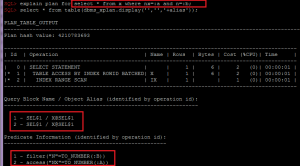One of the main performance technologies underlying ADW is the In-Memory format column cache and a question that has come up several times is: how does the columnar cache handle DMLs and cache invalidations. This blog post attempts to answer that question.
The Two Columnar Cache Formats
The original columnar cache was an idempotent rearrangement of Hybrid Columnar Compressed blocks into pure columnar form still in the original HCC encoding. This is known internally as “CC1” and was not applicable to row format blocks. Because this is an idempotent transformation we are able to reconstitute the original raw blocks from a CC1 cache if needed.
We then introduced the In-Memory format columnar cache where, if you had an In-Memory licence, we would run the 1 MB chunks processed by Smart Scan through the In-Memory loader and write new clean columns encoded in In-Memory formats which meant that we could then use the new SIMD based predicate evaluation and other performance improvements developed for Database In-Memory. If you do not have an In-Memory licence, the original CC1 column cache is used. Another advantage of the CC2 format is that we can load row format blocks as well as HCC format blocks into pure columnar In-Memory format.
Continue reading

